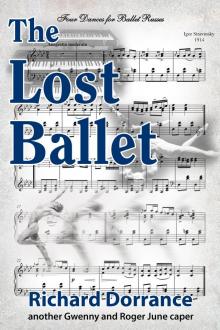- Home
- Richard Dorrance
The Lost Ballet Page 8
The Lost Ballet Read online
Page 8
Chapter 8 – The Production Begins
The Hall was the place where Anna and Richard had written the first draft of a score for a modern ballet, and was where Selgey and Bart had begun to choreograph the dancing. Richard wrote the story, which was about a girl from New York City meeting a boy from Charleston. It was a love story enmeshed in the clash of northern and southern culture, and found its way from paper onto large white boards set up on the stage. As the story evolved, Richard also wrote the music on his synthesizer, which Anna then transcribed for piano. All of the music was collected, digitally, into a computer.
The Hall now became the command center for the Stravinsky production. Seven of the eight team members showed up each morning, and spent most of the day there. Henric decided they could handle most of the production, and that his needs would be better met out on the waters of the Atlantic, practicing his sailing skills. He was in love with sailing.
There never was any doubt about Gwen’s role in the production. She was the impresario. Some of the other roles defined themselves equally well, and some didn’t. Selgey and Bart were the choreographers, and the Ps were dance advisors and gophers. That left Roger and Helstof. How did they fit in? Roger’s role was to be defined a week later. Until then, he was another gopher.
The earlier attempt to produce a ballet, based on the score by Richard and Anna, was a serious effort. They had hired an experienced theatrical administrator, recently retired from the San Francisco Ballet, who had moved to Charleston to be near family. This woman was ensconced in an office in the back of the theater, and had laid a lot of the groundwork required for a production, as it had been envisioned earlier. Gwen now invited her out to lunch, and told her there had been a change of plans. Immediately, the woman thought the ballet gig was over, and she was being laid off. The thought was not fatal to her, because she had come to Charleston to retire, and had taken the part time position for something to do. On the other hand, she felt disappointed, because she had discovered something new, which was the way Selgey and Bart played around with their choreography. They would dance up and down the aisles of the theater, practicing movements, fleshing out ideas, having fun, keeping in shape. Being as how they had been world-class dancers, even this playing around mesmerized anyone present. When they did this, Peter or Pater would go into the office in back and get the administrator, because they knew she loved to watch. After seeing this a few times, the woman realized she could sell tickets to it; the action was that good. She also had a new thought: sell tickets to seats in the theater for $25 each, with Selgey and Bart flowing up and down the aisles, and sell tickets to chairs set up on the stage for $100 each, from which people would watch the dancers flowing up and down the aisles. She was disappointed that she would not be able to try this new idea of hers, this dance production with a twist. These thoughts flowed through her head as she and Gwen ordered their food. She sipped her sweet tea with four lemon wedges in it, and waited for the shoe to drop, when Gwen explained the change of plans.
“Something has come up and we have to stop the project. It was too bad when Anna and Richard left to go to France. You kept going then, but things slowed a little. Selgey and Bart lost some of their inspiration, which came from working with Anna and Richard.”
The woman said, “That’s ok. It was great while it lasted. I didn’t really come to Charleston to work full time. I have lots of stuff I can do with my family. Too bad I won’t get to see if my idea of putting the dancers down among the seats, and the high-dollar patrons up on the stage, would work. I bet it would.”
Gwen took a bite of her fried green tomato with pimento cheese spread sandwich. She said, “Were stopping the production because something else has come up. I still want you to work here. In fact, if you can, I want you to work more. Full time. Something, ummm, more interesting has fallen into our laps. Something secret. Can you keep a secret?”
The woman stopped chewing her bite of dill shrimp salad, and looked at Gwen. What could be more interesting than working on a new ballet; on a new production Gwen had said was financed at a cool million dollars?
“Yes. I don’t really know anyone here, other than my family. I can keep a secret from them.”
“We’re going to do another production. Another ballet. Much bigger, much more important, and I’m going to be the chief. I don’t know what I’m doing, with ballet. I need your help.”
The woman thought, “What’s bigger than a million dollar premiere? That’s a lot of money for Charleston.” She said, “How much bigger? How would it be more important?”
Gwen ate more of her sandwich, trying to figure out how to explain the situation. She decided just to spit it out (not the sandwich); she didn’t think the woman would blab. “You know Stravinsky? You know how important he is in the history of ballet music? We found an unknown score of his. It’s ours, and we’re going to put it on. Here. Major production. Selgey and Bart will do original choreography. We’re thinking world-class production. I’m ready for the challenge of coordinating all that, but I need help. Your help. What do you think?”
The woman ate more of her shrimp salad, trying to figure out if this was a joke. Gwen didn’t appear to be joking. A lost ballet score by Stravinsky. World-class production, and being part of that. More shrimp. A little sweet tea. Being an administrator, and not an artist, she asked an intelligent and practical question. “Who’s financing, and how much?”
Gwen said, “Same guy. More.”
“How much more? Takes a lot of money to do what you’re talking about. Really a lot.”
“We have $25 million to play with. We should be able to give you a raise.”
The woman put down her fork, forgot to swallow, kept the shrimp in her mouth. No single production at the San Francisco Ballet ever had been underwritten at that level. In fact, no entire season of multiple productions ever had been financed with that amount. Gwen was talking a level that would half fund The New York City Ballet for the season. And here, in Charleston, she meant a single production.
Gwen hoped the woman would swallow soon. She hoped the woman would remember her mouth was full of shrimp before answering. She did. She said, “I’m in.”
Gwen now had the expertise she needed. She sat back and thought, “This is the big time. And we will succeed.” She issued her first order: “Get with Helstof. Tell her she’s doing the costuming. When she says yes, help her.”
The woman nodded.

 The Kidnapping of Paul McCartney
The Kidnapping of Paul McCartney The Lost Ballet
The Lost Ballet The Ayatollah's Money
The Ayatollah's Money Gwenny June
Gwenny June Aristocratic Thieves
Aristocratic Thieves Gwenny June's Tommy Crown Affair
Gwenny June's Tommy Crown Affair